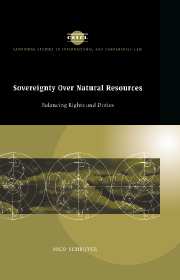Book contents
- Frontmatter
- Contents
- List of boxes, figures and tables
- Preface
- Acknowledgments
- List of abbreviations
- List of main symbols used in UN documents
- Glossary
- Table of cases
- 1 Introduction
- PART I The birth and development of the principle: the UN General Assembly as midwife
- Introductory remarks to Part I
- 2 The formative years (1945–1962)
- 3 Promoting economic development by the exercise of permanent sovereignty: the period after 1962
- 4 Permanent sovereignty, environmental protection and sustainable development
- 5 Permanent sovereignty over natural resources in territories under occupation or foreign administration
- PART II Natural-resource law in practice: from creeping national jurisdiction towards international co-operation
- PART III Balancing rights and duties in an increasingly interdependent world
- Appendices
- Bibliography
- Index
- Books in the series
3 - Promoting economic development by the exercise of permanent sovereignty: the period after 1962
Published online by Cambridge University Press: 23 October 2009
- Frontmatter
- Contents
- List of boxes, figures and tables
- Preface
- Acknowledgments
- List of abbreviations
- List of main symbols used in UN documents
- Glossary
- Table of cases
- 1 Introduction
- PART I The birth and development of the principle: the UN General Assembly as midwife
- Introductory remarks to Part I
- 2 The formative years (1945–1962)
- 3 Promoting economic development by the exercise of permanent sovereignty: the period after 1962
- 4 Permanent sovereignty, environmental protection and sustainable development
- 5 Permanent sovereignty over natural resources in territories under occupation or foreign administration
- PART II Natural-resource law in practice: from creeping national jurisdiction towards international co-operation
- PART III Balancing rights and duties in an increasingly interdependent world
- Appendices
- Bibliography
- Index
- Books in the series
Summary
From the 1960s, developing countries actively pursued the implementation of the principle of permanent sovereignty over natural resources because they perceived this to be a main basis for their economic development and for a redistribution of wealth and power in their relations with the industrialized world. Consequently, during the period 1963–70 emphasis on State control and the actual ways of implementing the principle of permanent sovereignty over natural resources increasingly received attention and the link between permanent sovereignty over natural resources and promoting the development of developing host countries was firmly established. General Assembly Resolution 2158 (XXI), in particular, was instrumental in this, both substantively and politically. The guidelines it entails for the relationship and co-operation between foreign investors and developing host countries contain a relevant and substantive inventory of the problems involved and recommend constructive policies. Politically, it was important that the broad coalition which supported the 1962 Declaration persisted.
Yet, after 1970 the discussion on permanent sovereignty over natural resources changed substantially. Some controversial elements were more vigorously introduced in the discussion on the scope and content of permanent sovereignty, in particular creeping jurisdiction of coastal States over adjacent sea areas and marine resources which often led to fishery disputes, and the issue of economic coercion. Furthermore, in the early 1970s an increasing number of developing countries nationalized certain sectors of their economies, including foreign-owned sectors, and sought international legitimization for these actions through the United Nations leading to a resumption of the ‘nationalization debate’.
- Type
- Chapter
- Information
- Sovereignty over Natural ResourcesBalancing Rights and Duties, pp. 82 - 119Publisher: Cambridge University PressPrint publication year: 1997
- 1
- Cited by



